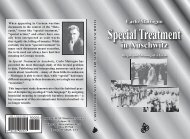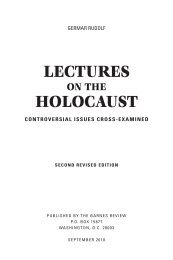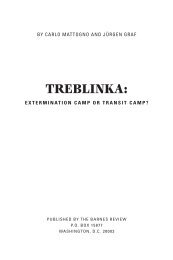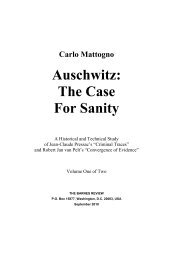- Page 1 and 2:
BARNES REVIEW HOLOCAUST HANDBOOK SE
- Page 3 and 4:
Jürgen H.P. Rieger, * 11 May 1946,
- Page 5 and 6:
HOLOCAUST Handbooks Series, vol. 19
- Page 7 and 8:
6 J. GRAF, T. KUES, C. MATTOGNO, SO
- Page 9 and 10:
8 J. GRAF, T. KUES, C. MATTOGNO, SO
- Page 11 and 12:
10 J. GRAF, T. KUES, C. MATTOGNO, S
- Page 13 and 14:
12 J. GRAF, T. KUES, C. MATTOGNO, S
- Page 15 and 16:
14 J. GRAF, T. KUES, C. MATTOGNO, S
- Page 17 and 18:
16 J. GRAF, T. KUES, C. MATTOGNO, S
- Page 19 and 20:
18 J. GRAF, T. KUES, C. MATTOGNO, S
- Page 21 and 22:
20 J. GRAF, T. KUES, C. MATTOGNO, S
- Page 23 and 24:
22 J. GRAF, T. KUES, C. MATTOGNO, S
- Page 25 and 26:
24 J. GRAF, T. KUES, C. MATTOGNO, S
- Page 27 and 28:
26 J. GRAF, T. KUES, C. MATTOGNO, S
- Page 29 and 30:
28 J. GRAF, T. KUES, C. MATTOGNO, S
- Page 31 and 32:
30 J. GRAF, T. KUES, C. MATTOGNO, S
- Page 33 and 34:
32 J. GRAF, T. KUES, C. MATTOGNO, S
- Page 35 and 36:
34 J. GRAF, T. KUES, C. MATTOGNO, S
- Page 37 and 38:
36 J. GRAF, T. KUES, C. MATTOGNO, S
- Page 39 and 40:
38 J. GRAF, T. KUES, C. MATTOGNO, S
- Page 41 and 42:
40 J. GRAF, T. KUES, C. MATTOGNO, S
- Page 43 and 44:
42 J. GRAF, T. KUES, C. MATTOGNO, S
- Page 45 and 46:
44 J. GRAF, T. KUES, C. MATTOGNO, S
- Page 47 and 48:
46 J. GRAF, T. KUES, C. MATTOGNO, S
- Page 49 and 50:
48 J. GRAF, T. KUES, C. MATTOGNO, S
- Page 51 and 52:
50 J. GRAF, T. KUES, C. MATTOGNO, S
- Page 53 and 54:
52 J. GRAF, T. KUES, C. MATTOGNO, S
- Page 55 and 56:
54 J. GRAF, T. KUES, C. MATTOGNO, S
- Page 57 and 58:
56 J. GRAF, T. KUES, C. MATTOGNO, S
- Page 59 and 60:
58 J. GRAF, T. KUES, C. MATTOGNO, S
- Page 61 and 62:
60 J. GRAF, T. KUES, C. MATTOGNO, S
- Page 64 and 65:
J. GRAF, T. KUES, C. MATTOGNO, SOBI
- Page 66 and 67:
J. GRAF, T. KUES, C. MATTOGNO, SOBI
- Page 68 and 69:
J. GRAF, T. KUES, C. MATTOGNO, SOBI
- Page 70 and 71:
J. GRAF, T. KUES, C. MATTOGNO, SOBI
- Page 72 and 73:
J. GRAF, T. KUES, C. MATTOGNO, SOBI
- Page 74 and 75:
J. GRAF, T. KUES, C. MATTOGNO, SOBI
- Page 76 and 77:
J. GRAF, T. KUES, C. MATTOGNO, SOBI
- Page 78 and 79:
J. GRAF, T. KUES, C. MATTOGNO, SOBI
- Page 80 and 81:
J. GRAF, T. KUES, C. MATTOGNO, SOBI
- Page 82 and 83:
J. GRAF, T. KUES, C. MATTOGNO, SOBI
- Page 84 and 85:
J. GRAF, T. KUES, C. MATTOGNO, SOBI
- Page 86 and 87:
J. GRAF, T. KUES, C. MATTOGNO, SOBI
- Page 88 and 89:
J. GRAF, T. KUES, C. MATTOGNO, SOBI
- Page 90 and 91:
J. GRAF, T. KUES, C. MATTOGNO, SOBI
- Page 92 and 93:
J. GRAF, T. KUES, C. MATTOGNO, SOBI
- Page 94 and 95:
J. GRAF, T. KUES, C. MATTOGNO, SOBI
- Page 96 and 97:
J. GRAF, T. KUES, C. MATTOGNO, SOBI
- Page 98 and 99:
J. GRAF, T. KUES, C. MATTOGNO, SOBI
- Page 100 and 101:
J. GRAF, T. KUES, C. MATTOGNO, SOBI
- Page 102 and 103:
J. GRAF, T. KUES, C. MATTOGNO, SOBI
- Page 104 and 105:
J. GRAF, T. KUES, C. MATTOGNO, SOBI
- Page 106 and 107:
J. GRAF, T. KUES, C. MATTOGNO, SOBI
- Page 108 and 109:
J. GRAF, T. KUES, C. MATTOGNO, SOBI
- Page 110 and 111:
J. GRAF, T. KUES, C. MATTOGNO, SOBI
- Page 112 and 113:
J. GRAF, T. KUES, C. MATTOGNO, SOBI
- Page 114 and 115:
J. GRAF, T. KUES, C. MATTOGNO, SOBI
- Page 116 and 117:
J. GRAF, T. KUES, C. MATTOGNO, SOBI
- Page 118 and 119:
J. GRAF, T. KUES, C. MATTOGNO, SOBI
- Page 120 and 121:
J. GRAF, T. KUES, C. MATTOGNO, SOBI
- Page 122 and 123:
J. GRAF, T. KUES, C. MATTOGNO, SOBI
- Page 124 and 125:
J. GRAF, T. KUES, C. MATTOGNO, SOBI
- Page 126 and 127:
J. GRAF, T. KUES, C. MATTOGNO, SOBI
- Page 128 and 129:
J. GRAF, T. KUES, C. MATTOGNO, SOBI
- Page 130 and 131:
J. GRAF, T. KUES, C. MATTOGNO, SOBI
- Page 132 and 133:
J. GRAF, T. KUES, C. MATTOGNO, SOBI
- Page 134 and 135:
J. GRAF, T. KUES, C. MATTOGNO, SOBI
- Page 136 and 137:
J. GRAF, T. KUES, C. MATTOGNO, SOBI
- Page 138 and 139:
J. GRAF, T. KUES, C. MATTOGNO, SOBI
- Page 140 and 141:
J. GRAF, T. KUES, C. MATTOGNO, SOBI
- Page 142 and 143:
J. GRAF, T. KUES, C. MATTOGNO, SOBI
- Page 144 and 145:
J. GRAF, T. KUES, C. MATTOGNO, SOBI
- Page 146 and 147:
J. GRAF, T. KUES, C. MATTOGNO, SOBI
- Page 148 and 149:
J. GRAF, T. KUES, C. MATTOGNO, SOBI
- Page 150 and 151:
J. GRAF, T. KUES, C. MATTOGNO, SOBI
- Page 152 and 153:
J. GRAF, T. KUES, C. MATTOGNO, SOBI
- Page 154 and 155:
J. GRAF, T. KUES, C. MATTOGNO, SOBI
- Page 156 and 157:
J. GRAF, T. KUES, C. MATTOGNO, SOBI
- Page 158 and 159:
J. GRAF, T. KUES, C. MATTOGNO, SOBI
- Page 160 and 161:
J. GRAF, T. KUES, C. MATTOGNO, SOBI
- Page 162 and 163:
J. GRAF, T. KUES, C. MATTOGNO, SOBI
- Page 164 and 165:
J. GRAF, T. KUES, C. MATTOGNO, SOBI
- Page 166 and 167:
J. GRAF, T. KUES, C. MATTOGNO, SOBI
- Page 168 and 169:
J. GRAF, T. KUES, C. MATTOGNO, SOBI
- Page 170 and 171:
J. GRAF, T. KUES, C. MATTOGNO, SOBI
- Page 172 and 173:
J. GRAF, T. KUES, C. MATTOGNO, SOBI
- Page 174 and 175:
J. GRAF, T. KUES, C. MATTOGNO, SOBI
- Page 176 and 177:
J. GRAF, T. KUES, C. MATTOGNO, SOBI
- Page 178 and 179:
J. GRAF, T. KUES, C. MATTOGNO, SOBI
- Page 180 and 181:
J. GRAF, T. KUES, C. MATTOGNO, SOBI
- Page 182 and 183:
J. GRAF, T. KUES, C. MATTOGNO, SOBI
- Page 184 and 185:
J. GRAF, T. KUES, C. MATTOGNO, SOBI
- Page 186 and 187:
J. GRAF, T. KUES, C. MATTOGNO, SOBI
- Page 188 and 189:
J. GRAF, T. KUES, C. MATTOGNO, SOBI
- Page 190 and 191:
J. GRAF, T. KUES, C. MATTOGNO, SOBI
- Page 192 and 193:
J. GRAF, T. KUES, C. MATTOGNO, SOBI
- Page 194 and 195:
J. GRAF, T. KUES, C. MATTOGNO, SOBI
- Page 196 and 197:
J. GRAF, T. KUES, C. MATTOGNO, SOBI
- Page 198 and 199:
J. GRAF, T. KUES, C. MATTOGNO, SOBI
- Page 200 and 201:
J. GRAF, T. KUES, C. MATTOGNO, SOBI
- Page 202 and 203:
J. GRAF, T. KUES, C. MATTOGNO, SOBI
- Page 204 and 205:
J. GRAF, T. KUES, C. MATTOGNO, SOBI
- Page 206 and 207:
J. GRAF, T. KUES, C. MATTOGNO, SOBI
- Page 208 and 209:
J. GRAF, T. KUES, C. MATTOGNO, SOBI
- Page 210 and 211:
J. GRAF, T. KUES, C. MATTOGNO, SOBI
- Page 212 and 213:
J. GRAF, T. KUES, C. MATTOGNO, SOBI
- Page 214 and 215:
J. GRAF, T. KUES, C. MATTOGNO, SOBI
- Page 216 and 217:
J. GRAF, T. KUES, C. MATTOGNO, SOBI
- Page 218:
J. GRAF, T. KUES, C. MATTOGNO, SOBI
- Page 221 and 222:
220 J. GRAF, T. KUES, C. MATTOGNO,
- Page 223 and 224:
222 J. GRAF, T. KUES, C. MATTOGNO,
- Page 225 and 226:
224 J. GRAF, T. KUES, C. MATTOGNO,
- Page 227 and 228:
226 J. GRAF, T. KUES, C. MATTOGNO,
- Page 229 and 230:
228 J. GRAF, T. KUES, C. MATTOGNO,
- Page 231 and 232:
230 J. GRAF, T. KUES, C. MATTOGNO,
- Page 233 and 234:
232 J. GRAF, T. KUES, C. MATTOGNO,
- Page 235 and 236:
234 J. GRAF, T. KUES, C. MATTOGNO,
- Page 237 and 238:
236 J. GRAF, T. KUES, C. MATTOGNO,
- Page 239 and 240:
238 J. GRAF, T. KUES, C. MATTOGNO,
- Page 241 and 242:
240 J. GRAF, T. KUES, C. MATTOGNO,
- Page 243 and 244:
242 J. GRAF, T. KUES, C. MATTOGNO,
- Page 245 and 246:
244 J. GRAF, T. KUES, C. MATTOGNO,
- Page 247 and 248:
246 J. GRAF, T. KUES, C. MATTOGNO,
- Page 249 and 250:
248 J. GRAF, T. KUES, C. MATTOGNO,
- Page 251 and 252:
250 J. GRAF, T. KUES, C. MATTOGNO,
- Page 253 and 254:
252 J. GRAF, T. KUES, C. MATTOGNO,
- Page 255 and 256:
254 J. GRAF, T. KUES, C. MATTOGNO,
- Page 257 and 258:
256 J. GRAF, T. KUES, C. MATTOGNO,
- Page 259 and 260:
258 J. GRAF, T. KUES, C. MATTOGNO,
- Page 261 and 262:
260 J. GRAF, T. KUES, C. MATTOGNO,
- Page 263 and 264:
262 J. GRAF, T. KUES, C. MATTOGNO,
- Page 265 and 266:
264 J. GRAF, T. KUES, C. MATTOGNO,
- Page 267 and 268:
266 J. GRAF, T. KUES, C. MATTOGNO,
- Page 269 and 270:
268 J. GRAF, T. KUES, C. MATTOGNO,
- Page 271 and 272:
270 J. GRAF, T. KUES, C. MATTOGNO,
- Page 273 and 274:
272 J. GRAF, T. KUES, C. MATTOGNO,
- Page 275 and 276:
274 J. GRAF, T. KUES, C. MATTOGNO,
- Page 277 and 278:
276 J. GRAF, T. KUES, C. MATTOGNO,
- Page 279 and 280:
278 J. GRAF, T. KUES, C. MATTOGNO,
- Page 281 and 282:
280 J. GRAF, T. KUES, C. MATTOGNO,
- Page 283 and 284:
282 J. GRAF, T. KUES, C. MATTOGNO,
- Page 285 and 286:
284 J. GRAF, T. KUES, C. MATTOGNO,
- Page 287 and 288:
286 J. GRAF, T. KUES, C. MATTOGNO,
- Page 289 and 290: 288 J. GRAF, T. KUES, C. MATTOGNO,
- Page 291 and 292: 290 J. GRAF, T. KUES, C. MATTOGNO,
- Page 293 and 294: 292 J. GRAF, T. KUES, C. MATTOGNO,
- Page 295 and 296: 294 J. GRAF, T. KUES, C. MATTOGNO,
- Page 297 and 298: 296 J. GRAF, T. KUES, C. MATTOGNO,
- Page 299 and 300: 298 J. GRAF, T. KUES, C. MATTOGNO,
- Page 301 and 302: 300 J. GRAF, T. KUES, C. MATTOGNO,
- Page 303 and 304: 302 J. GRAF, T. KUES, C. MATTOGNO,
- Page 305 and 306: 304 J. GRAF, T. KUES, C. MATTOGNO,
- Page 307 and 308: 306 J. GRAF, T. KUES, C. MATTOGNO,
- Page 309 and 310: 308 J. GRAF, T. KUES, C. MATTOGNO,
- Page 311 and 312: 310 J. GRAF, T. KUES, C. MATTOGNO,
- Page 313 and 314: 312 J. GRAF, T. KUES, C. MATTOGNO,
- Page 315 and 316: 314 J. GRAF, T. KUES, C. MATTOGNO,
- Page 317 and 318: 316 J. GRAF, T. KUES, C. MATTOGNO,
- Page 319 and 320: 318 J. GRAF, T. KUES, C. MATTOGNO,
- Page 321 and 322: 320 J. GRAF, T. KUES, C. MATTOGNO,
- Page 323 and 324: 322 J. GRAF, T. KUES, C. MATTOGNO,
- Page 325 and 326: 324 J. GRAF, T. KUES, C. MATTOGNO,
- Page 327 and 328: 326 J. GRAF, T. KUES, C. MATTOGNO,
- Page 329 and 330: 328 J. GRAF, T. KUES, C. MATTOGNO,
- Page 331 and 332: 330 J. GRAF, T. KUES, C. MATTOGNO,
- Page 333 and 334: 332 J. GRAF, T. KUES, C. MATTOGNO,
- Page 335 and 336: 334 J. GRAF, T. KUES, C. MATTOGNO,
- Page 337 and 338: 336 J. GRAF, T. KUES, C. MATTOGNO,
- Page 339: 338 J. GRAF, T. KUES, C. MATTOGNO,
- Page 343 and 344: 342 J. GRAF, T. KUES, C. MATTOGNO,
- Page 345 and 346: 344 J. GRAF, T. KUES, C. MATTOGNO,
- Page 348 and 349: J. GRAF, T. KUES, C. MATTOGNO, SOBI
- Page 350 and 351: J. GRAF, T. KUES, C. MATTOGNO, SOBI
- Page 352 and 353: J. GRAF, T. KUES, C. MATTOGNO, SOBI
- Page 354 and 355: J. GRAF, T. KUES, C. MATTOGNO, SOBI
- Page 356 and 357: J. GRAF, T. KUES, C. MATTOGNO, SOBI
- Page 358 and 359: J. GRAF, T. KUES, C. MATTOGNO, SOBI
- Page 360 and 361: J. GRAF, T. KUES, C. MATTOGNO, SOBI
- Page 362 and 363: J. GRAF, T. KUES, C. MATTOGNO, SOBI
- Page 364 and 365: J. GRAF, T. KUES, C. MATTOGNO, SOBI
- Page 366 and 367: J. GRAF, T. KUES, C. MATTOGNO, SOBI
- Page 368 and 369: J. GRAF, T. KUES, C. MATTOGNO, SOBI
- Page 370 and 371: J. GRAF, T. KUES, C. MATTOGNO, SOBI
- Page 372 and 373: J. GRAF, T. KUES, C. MATTOGNO, SOBI
- Page 374 and 375: J. GRAF, T. KUES, C. MATTOGNO, SOBI
- Page 376 and 377: J. GRAF, T. KUES, C. MATTOGNO, SOBI
- Page 378 and 379: J. GRAF, T. KUES, C. MATTOGNO, SOBI
- Page 380 and 381: J. GRAF, T. KUES, C. MATTOGNO, SOBI
- Page 382 and 383: J. GRAF, T. KUES, C. MATTOGNO, SOBI
- Page 384 and 385: J. GRAF, T. KUES, C. MATTOGNO, SOBI
- Page 386 and 387: J. GRAF, T. KUES, C. MATTOGNO, SOBI
- Page 388 and 389: J. GRAF, T. KUES, C. MATTOGNO, SOBI
- Page 390 and 391:
J. GRAF, T. KUES, C. MATTOGNO, SOBI
- Page 392 and 393:
J. GRAF, T. KUES, C. MATTOGNO, SOBI
- Page 394 and 395:
J. GRAF, T. KUES, C. MATTOGNO, SOBI
- Page 396 and 397:
J. GRAF, T. KUES, C. MATTOGNO, SOBI
- Page 398 and 399:
J. GRAF, T. KUES, C. MATTOGNO, SOBI
- Page 400 and 401:
J. GRAF, T. KUES, C. MATTOGNO, SOBI
- Page 402 and 403:
J. GRAF, T. KUES, C. MATTOGNO, SOBI
- Page 404 and 405:
J. GRAF, T. KUES, C. MATTOGNO, SOBI
- Page 406 and 407:
J. GRAF, T. KUES, C. MATTOGNO, SOBI
- Page 408 and 409:
J. GRAF, T. KUES, C. MATTOGNO, SOBI
- Page 410 and 411:
J. GRAF, T. KUES, C. MATTOGNO, SOBI
- Page 412 and 413:
J. GRAF, T. KUES, C. MATTOGNO, SOBI
- Page 414 and 415:
J. GRAF, T. KUES, C. MATTOGNO, SOBI
- Page 416 and 417:
J. GRAF, T. KUES, C. MATTOGNO, SOBI
- Page 418 and 419:
J. GRAF, T. KUES, C. MATTOGNO, SOBI
- Page 420 and 421:
J. GRAF, T. KUES, C. MATTOGNO, SOBI
- Page 422 and 423:
J. GRAF, T. KUES, C. MATTOGNO, SOBI
- Page 424 and 425:
J. GRAF, T. KUES, C. MATTOGNO, SOBI
- Page 426 and 427:
J. GRAF, T. KUES, C. MATTOGNO, SOBI
- Page 428 and 429:
J. GRAF, T. KUES, C. MATTOGNO, SOBI
- Page 430 and 431:
J. GRAF, T. KUES, C. MATTOGNO, SOBI
- Page 432 and 433:
J. GRAF, T. KUES, C. MATTOGNO, SOBI
- Page 434 and 435:
J. GRAF, T. KUES, C. MATTOGNO, SOBI
- Page 436 and 437:
HOLOCAUST HANDBOOKS — The Series
- Page 438 and 439:
G. Rudolf, C. Mattogno: Auschwitz L
- Page 440:
Carlo Mattogno: Auschwitz: Cremator

















